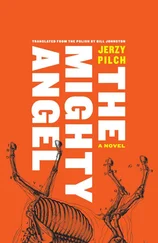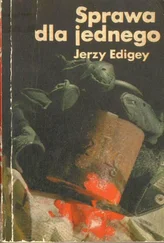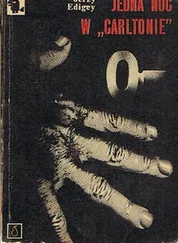I had succeeded in not saying a single word to anyone because we were in the grip of a severe cold spell. For several days, I had been going to and coming from school through air that was stiffening with icy explosions. Minus-four-degree labyrinths were becoming ever longer, ever more intricate and stuffy. That day, when, having passed through the Square at the Ponds, Filarecka Street, the Commons, I finally made it to the North Pole, a document with seals affixed to it was hanging on the closed doors stating that, on account of atmospheric conditions that threaten to disturb the learning process, classes — by decision of the board of education — were cancelled. I remember that this didn’t particularly please me, or upset me. In general, school was a matter of indifference to me. Mrs. Prościutko, the handcrafts teacher, a heavily made up thirty-year-old, got me a little hot, but that was it. I had neither any particular troubles, nor any particular satisfactions. Now the only good thing was that I had been one of the first to read the flowery document announcing the sudden holiday. I always got to school very early. Nobody at all was there yet from my class. I didn’t have to pretend to participate in the cattle herd’s joy that school’s out!
I set off for home as quickly as possible. The labyrinths had gotten so thick by now that it seemed to me that I was climbing, as in a dream, higher and higher. Down below I saw the city submerged in a yellow crystal — black roofs, pigeons turned into ice, the dead and empty canals of the alleyways. My celestial roaming went on for a bit, but finally I dragged myself home. In the stairwell, with my heart in my throat, I passed by a famous local beggar. He had supposedly once been a commander in the White Army. And indeed, as he glided through the streets of Krakow, he had in him the majesty of a scorched and wasted galleon, which nonetheless still maintained its daring profile. At his sight, I usually took to my heels; now I heroically stepped over the crutches lying crosswise, blackened and covered with fossilized hoar-frost. He mumbled something, but in my hurry and panic I didn’t understand precisely what. Today I think that he said, The moonlit grass has overgrown the Bay of St. Susanna. You must prepare for the coming of the Lord of Surges . In any event, such are the sentences I hear when I recreate that day, pitilessly, minute by minute. The moonlit grass has overgrown the Bay of St. Susanna. You must prepare for the coming of the Lord of Surges. I opened the door with numb hands, and, frozen to death, slowly and systematically thawed myself out, so that in the evening I might be able to go out onto the balcony — efficiently and silently. I warmed my hands up particularly carefully; after all, I wouldn’t be able to manage it with stiff fingers. That was all — hot water and finger gymnastics — nothing more. I no longer practiced the silent opening of the drapes. As a future first-league soccer player and a representative of Poland, I knew the principle that in the final hours before the match you were not allowed to devote your time to practice, but only and exclusively to relaxation.
First, I read The Mysterious Island , probably for the hundredth time. Then I took some condoms from Father’s drawer, one of which I blew up, and I played a little soccer. The goal was between the dresser and the door to the little room; I made most of the goals with headers — I was Brazil, and I had won the World Cup. Then I made myself kogel-mogel . I couldn’t find powdered sugar, so I beat two egg yolks with regular sugar, sprinkled in some cocoa — it wasn’t bad. Then I wanted to play shove halfpenny on the windowsill, but I didn’t have time, because Mother had returned, and you couldn’t play shove halfpenny in her presence, because she thought it was a game of chance played for money, and — deaf to all persuasion — she positively forbade it. For obvious reasons I gave it up right away. I didn’t want to get into sterile debates. I didn’t want to talk at all.
Mother declared, in the doorway already, that my old man would most likely return late, since she was more dead than alive and full of premonitions. Moreover, she had had terrible dreams the night before, and her dreams and premonitions always came true. My prospects were looking up. Since Mother was more dead than alive and full of bad dreams and premonitions, she ceased speaking after a certain time. All indications were for a stiflingly quiet afternoon. Incidentally, even when her dreams and premonitions did not come true, she maintained that they had come true in a certain sense , that, at the worst, they would come true sooner or later . And besides, with time, the quantity and frequency of her bad dreams and premonitions grew; therefore, naturally, their accuracy also grew. If a person has evil premonitions on a daily basis, he experiences nothing but the expected evil.
In any event, on the day of my first suicide attempt, my old man didn’t come home for a long time indeed, and there is no need to add that if he wasn’t there, he didn’t speak up. The insect glass (although one should say: the glass of insects) grew thicker. My kidneys began to hum a mournful little song. With a feeling of acute absurdity (I didn’t know at the time that I had a feeling of acute absurdity), I did my homework. I was aware that I was doing the last homework assignments of my life, and I took pains — as if I were sending them off on a final journey — that they be perfect. I did them with unusual care. Later I felt sorry for the calligraphic Polish essay, sorry for the perfectly solved mathematical problem, sorry for the lined notebook, and sorry for the quadrille notebook. I imagined that neither my homework nor my notebooks would find their way to school ever again. By morning, I would be dead, and my book bag would be lying next to the bookshelf, and nobody would look into it. Unless it was the police (at that time called the militia ), in order to check whether I had left a farewell letter, or whether, in one of the notebooks, there were notes of some sort explaining my desperate step.
I felt like crying, but my mood lifted at the thought that, in the morning, when my corpse would be lying at the bottom of the apartment block, our apartment would be swarming with uniformed functionaries. I knew that my old man would fear them like the devil. Not that he would have anything on his conscience, but just on account of his basic fearfulness. My old man went to pieces before every person of higher rank. He cracked before his bosses, the professors and directors of departments at the Academy; he cracked before officials in offices; he was even afraid of the custodian of our apartment block, Mr. Markiewicz, who was eternally tipsy and eternally cursed women and Communism. In a word, my old man was afraid of practically everyone, but in the face of all those who wore uniforms (including conductors on trains or trams — in those days there were still conductors on trams), he suffered from blind animal fear.
To tell the truth, my old man — short, born in Cieszyn Silesia, a Lutheran, not very bright, but industrious as an ant; who had been drafted into the Wehrmacht during the war, and after the war became a Party member — had his reasons for having numerous complexes. I do not wish to suggest that he despaired in vain, and for all his life, that he was not born in Wilno, a tall non-Party Catholic, full of panache, of broad talents, who had served with Anders during the war, and embarked upon internal emigration after the war. I don’t wish to suggest this, but the poor devil unquestionably paid a price for being who he was.
Once, I recall, I was riding with him in our Fiat 125, and a militiaman from the traffic patrol pulled us over on account of one or another of the most banal violations in the world — failure to use a turn signal, or something like that. Jesus Christ! What a scene that was! My old man! God the Father! The Patriarch! King Solomon! David and Goliath in one person! Jesus — now that I think of it — Christ! — shook with fear, was close to messing his pants, and tearfully explained himself to the twenty-year-old sergeant, who himself was embarrassed by the inhuman horror he had aroused in this — as his identity card made clear — engineer from the Academy of Mining and Metallurgy, who was more than twice his age.
Читать дальше












